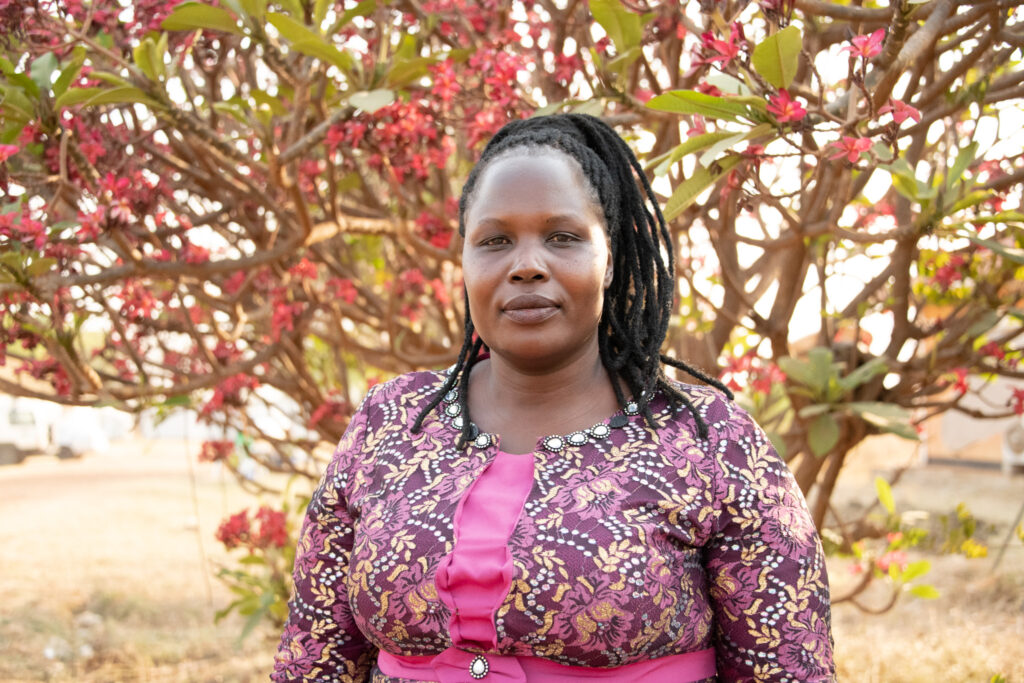Many people living with HIV face discrimination. When this discrimination meets other inequalities, the virus can become even more life-threatening. NEPWU is a South Sudanese organisation that aims to overcome gender-based inequalities to improve HIV care.
The stigma around HIV can be strong. And at times even fatal. Meet Evelyn Letio Unzi Boki and Peninah Moriku Gabu. After their HIV diagnosis, they overcame the stigma attached to their status. Now, Evelyn and Peninah feel they have the duty to empower others.
Together with 28 other members, they co-founded NEPWU (National Empowerment of Positive Women United), a women-led organisation that supports women and mothers living with HIV in South Sudan. NEPWU also supports their children and families through its programme.
Stigma can be fatal
“Making HIV treatment available is not enough. You must ensure that people living with HIV are safe and strong enough to take the treatment”, says Evelyn. “People, and especially women, can die because of the HIV stigma.”
Diagnosed at the age of 26 years, Peninah experienced how women living with HIV face discrimination and even violence. “In South Sudan, because of your HIV status, you can lose your job, you can lose your marriage, you can be beaten, you can even be killed. You are already facing inequalities when you are a woman. If you are HIV positive on top of that, things get even worse.”
“We recruit mothers who are free from stigma and are successful with their treatment. Mothers who are willing to help others to become free from fear.”
In South Sudan, 2.5% of adults are living with HIV. Most new HIV cases come from mothers transmitting to their newborn children, often during delivery, breastfeeding and pregnancy.
Mother-to-child transmission can be avoided when treatment is taken early enough in the pregnancy. Early detection is the key to ensuring mothers can give birth to HIV-negative children. That is why working with mothers-to-be is essential.
“I am a woman living with HIV,” explains Evelyn. “My dream is to inspire other women. Despite my status, I gave birth to HIV-negative children. I was able to provide for my children. I was able to overcome the burden of HIV and move forward in life.”
Stigma can dissuade women from getting a diagnosis. The stigma can mean that young mothers are rejected by their families, pushing them and their newborns into precarious conditions. This is where NEPWU has a programme that makes a difference for mothers-to-be.
Mentor mothers
Peninah was one of the first mentor mothers of the programme. Today, after more than 15 years of experience, she trains the next generation of mothers.
“They are mothers living with HIV that can share their experiences in overcoming burdens. We recruit mothers who are free from stigma and are successful with their treatment. Mothers who can disclose their status anywhere, at any time. Mothers who are willing to help others to become free from fear.”
NEPWU trains and supports mentor mothers and fathers whose role it is to provide health education on HIV, among other diseases, to refer people within their communities to health services, and support people living with HIV who face stigma and gender-based violence.
Peninah: “The mentors are present at the health facility. One of their roles is to accompany mothers-to-be to get tested. They help them cope with the shock of being diagnosed with HIV. When they have difficulties accepting their diagnosis, causing delays in their treatments, they go and talk with them. They draw follow-up plans and visit them at their homes to see how they are doing. Over time, mothers begin to cope with the process.”

What makes Peninah’s story particularly effective, is her ability to draw from personal experiences. “After being diagnosed, I had three more children, and all of them are negative. So, when I share my experience, they see I look healthy, and I’m working hard, the mothers become hopeful and convinced. We can see them lining up voluntarily for HIV testing. That is what empowerment means. And the women we empower, will go around and empower other women.”
“I know this works. I know this can save the lives of women and children.”
The need for societal change
While their support for women living with HIV bears fruit, stigma and discrimination remain huge hurdles. “It’s still difficult”, says Peninah. “The violence, the abuse, the killing, the finger-pointing. If you cannot disclose your status for fear of violence, you will hide and live in the margins. You will take your treatment in secret, and sometimes not at all.”
NEPWU’s mentors raise awareness in communities on HIV, sexually transmitted infections, tuberculosis and gender-based violence. They give testimonies on their HIV status and their lives to reduce societal stigma.
Peninah: “We are working voluntarily. We will need more funds for our awareness-raising activities. The societal stigma is still very high. Sometimes I say God gave me this infection for a purpose, to change the lives of others. I have mentored many women. I know this works. I know this can save the lives of women and children.”
Cordaid’s HIV and TB programme in South Sudan is made possible thanks to the Global Fund. We support 136 health facilities across six out of ten states. Among other activities aimed at strengthening health care for HIV and tuberculosis, Cordaid pays incentives to NEPWU’s mentors and in doing so contributes to adherence to treatment, awareness raising and reducing stigma.
Written by Adriana Parejo Pagador, Communication Officer for Global Health Global Access at Cordaid.
Header image: Evelyn Letio Unzi Boki (left), co-founder of NEPWU and an advocate for women living with HIV. Image: Adriana Parejo Pagador/Cordaid
